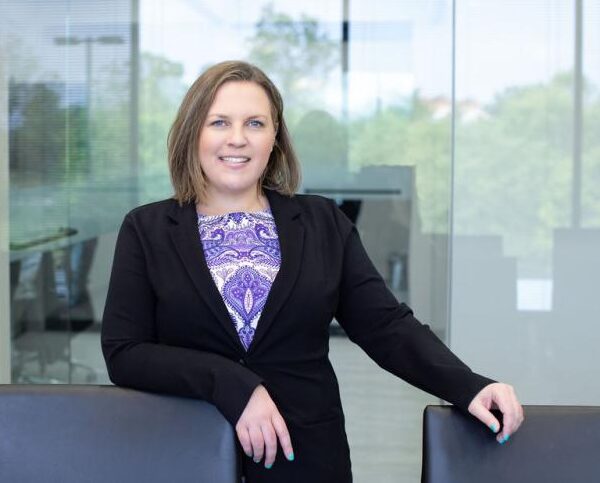

From Pre-Med to Estate Planning: A Journey of Unexpected Turns and Meaningful Connections
The Anne Arundel Estate Planning Council recently sat down with Jesse Walsh, Executive Committee member, to discuss her journey, the challenges she has faced, and her aspirations for the future. Below is a detailed look at her professional background and insights:
What inspired you to pursue a career in your current field, and what were some pivotal moments along the way?
Can you share an experience or decision that significantly shaped your professional or personal life?
Definitely volunteering! I’ve done a lot of different types of volunteering throughout my life, all of which have contributed to my professional development in various ways. But I think the most significant experience was serving as an AmeriCorps volunteer teacher between undergrad and grad school. During that time, I taught math, science, and philosophy to middle school students in New Haven, CT. Teaching 12- and 13-year-olds anything while simultaneously keeping them from harming themselves or others has to be the hardest job on Earth, and it prepares you for virtually any demanding career. Many of the professional skills that I lean on today were acquired and/or honed while teaching—public speaking, empathy, listening, problem solving, adaptation/flexibility, persistence, resilience, optimism, critical thinking, creativity, remaining calm in crisis/under stress, leadership, and of course, actual teaching. Volunteering is such an important way to support and connect with your community while enriching yourself personally and professionally in the process. I’d consider it an essential part of any professional’s toolkit for success.
What is one thing you wish more people understood about your work or your industry?
Many people (incorrectly) believe that speaking with an estate planning professional about planning for death and/or incapacity is an activity that only applies to very wealthy, elderly, and/or terminally ill people. In many cases, people who feel that way wait too long, and it is never ideal to try to scramble to put things in order on a tight deadline. The very best time to make a plan is when you are healthy and able-bodied, not when you’ve just received devastating news from a medical professional. I can promise that if you’re in that situation, you want to be spending every single minute with your loved ones, not combing through paperwork with attorneys and rushing through important decisions. EVERY adult should be having these conversations with a licensed professional, because if you put it off too long, then instead of getting to decide for yourself who should manage your finances/medical treatment on your behalf (if you’re alive but incapacitated), or raise your children (if you’re deceased or incapacitated), or inherit your assets (if you’re deceased), the State of Maryland makes those choices for you.
Likewise, on the estate administration side, I wish more people would reach out to an attorney (or the Register of Wills) for advice sooner. Many people grieve the loss of their loved ones and then consult social media for advice on dividing up assets. Please don’t do that – you are putting yourself at great risk! We are each unique individuals with unique circumstances, and laws vary widely by jurisdiction. Just because your Great Aunt Susan’s house in Texas didn’t have to go through probate does not mean that the same is true for your parents’ home in Maryland. Many attorneys are willing to have a no-cost consult to help potential clients determine what they will need to do to wind up their loved one’s affairs and lawfully transfer their assets. Take advantage!
How do you stay updated and continue to learn in your field?
I stay involved in professional organizations! As an attorney, once you’ve completed school and entered the workforce, you are more responsible for your own professional development than ever before. There’s likely no one forcing you to stay up-to-date on changes in your practice area, or providing you with a structure or rubric for doing so. Nonetheless, it’s vitally important that you position yourself to give your clients relevant, timely, and accurate advice. For me, joining professional organizations in my field (such as AAEPC) has been indispensable in keeping me on track—they host educational events, publish newsletters, and provide regular opportunities for members to meet and discuss the most important and evolving issues of the moment. I’ve been able to connect with people who have diverse areas of expertise and experience, and I can call on them when I run into an issue I need help working through. One of the most valuable things all professionals need to accept is that we can’t possibly know everything, but we can build a network that can collectively identify answers and solutions to virtually any difficulty we face. Accomplishing that is tantamount to unlocking the highest-level professional superpower.
What hobbies or activities do you enjoy outside of work, and how do they influence your professional performance?
Outside of work, the three activities I spend most of my time engaged in are home improvement projects, rock hounding/tumbling, and rescuing cats with special needs. I do these things because I enjoy them, but I have no doubt that they also contribute to my well-roundedness as a professional. They foster creativity, problem-solving, persistence, patience, dedication, organization, negotiation, a sense of accomplishment, empathy, and physical and mental strength. Plus, they’re all pretty expensive hobbies, which motivates me to keep working hard so I can continue to afford them. 😊
What advice would you give to someone starting in your industry today?
Network, network, network! People really hate hearing that answer, and it’s probably cliché, but weaving yourself into the professional fabric of your community is very much at the top of the list of things you can do to set yourself up for success. Here’s a testimonial example from my own career: I met a financial advisor at an AAEPC event during my first year as an attorney. I had never been to an AAEPC event, didn’t know anyone there, and I am definitely an introvert. But I told myself I was going to walk in, speak to one person, and then casually sneak out before having to meet a second person. That’s more or less what I did, and by sheer luck or coincidence, the one person I walked up to ended up having a significant impact on my career. At the time, I was employed in a place where I probably would never have realized my fullest potential (or where it would have taken me years longer to do so), but I kind of normalized it by telling myself that’s what being a new attorney is like. But that financial advisor, despite meeting me only briefly, instantly recognized that I could do better, and subsequently took it upon herself to connect me with a friend of hers—a partner at a law firm who was looking to hire someone just like me. I didn’t ask her to do that, and I wasn’t actively seeking another job, but she had the experience and insight to see something I didn’t (yet). I took a leap, and I can unequivocally say a year and a half later that she was right—Liff, Walsh & Simmons has been an incredibly supportive place to work, learn, and grow. They have provided me with opportunities and tools to become the very best version of myself that I can be, and I am excelling as a result. They see and appreciate my value, reward me for my hard work, and inspire me to be better every day.
One of the fondest sayings I took with me from public health school is “a rising tide lifts all boats.” There are a lot of ways to interpret that, but I think the most relevant to young or inexperienced professionals is that there are people in the world who want to lift you up and see you succeed, and they will do that for you without asking for anything in return. If you find networking scary or overwhelming, try to remember that there is at least one person at each event who is able and willing to reach out their hand and pull you up to the next level or walk alongside you as a partner. You just have to show up and talk to them.